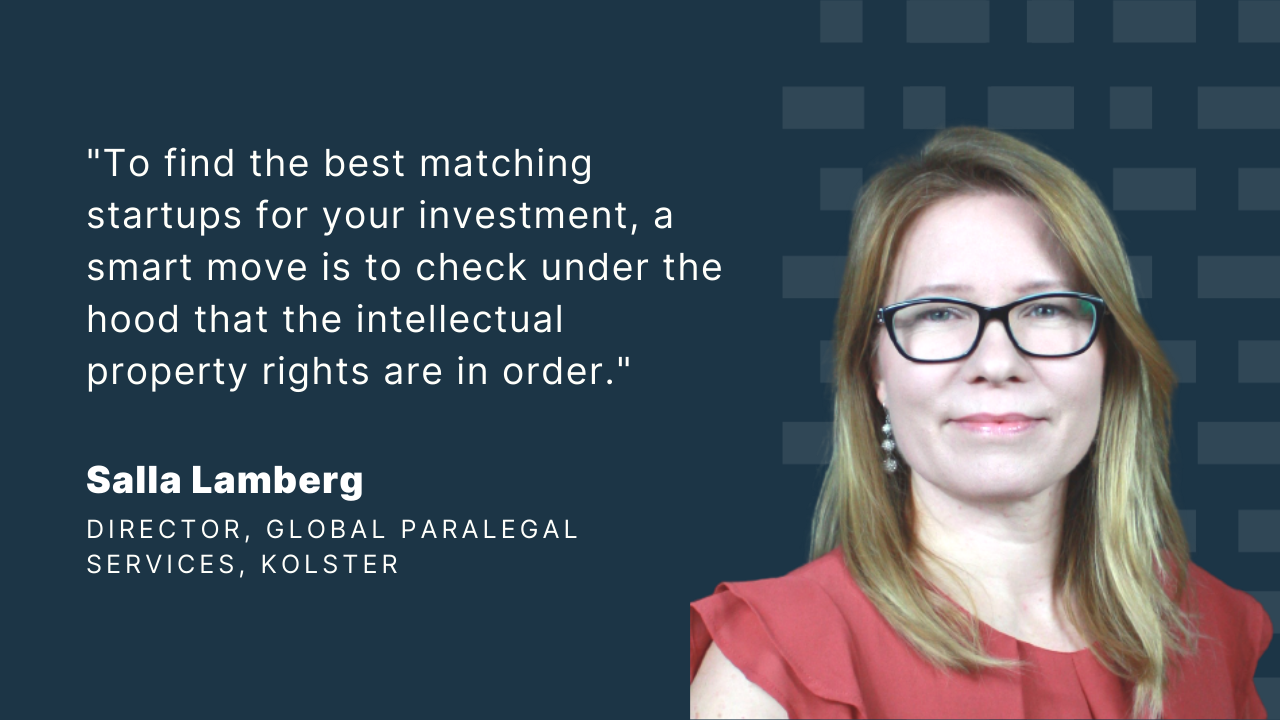
1. Startups that have taken IPR seriously feel more trustworthy
The early days of startup businesses are full of insecurities. The challenges are measured in megawatts. The business idea needs to be interesting, the business model scalable, growth is a must, and business angels are needed to ensure the company can invest in technology, services, partnerships, marketing, practically to everything that holds up the house-of-cards they have built up.
From an investor’s point of view, there needs to be reasonable signs that the company has a liable future. The business plan usually includes all the essential elements, but what we may see missing is the IPR strategy. How much thought has the company put into its IPR matters? Have they secured their brand and registered their trademarks? Is the company name even registered?
To find the best matching startups for your investment, a smart move is to check under the hood that the intellectual property rights are in order. When expanding to the new markets, there is more trust the new brand or products cannot be easily copied when they are protected. And if they are copied, there are tools and means to fight back.
2. Registered trademark, product design, and patented inventions accelerate sales
Every investor wants the startup to grow and become profitable, to make money. This needs serious sales efforts from the company, bold market expansion, and scalability strategies. To get money flowing in with successful sales, startups need the customers to trust their products and services. Trust is linked with a positive brand image, and a positive brand image is strengthened with registered trademarks and designs, and trust in new innovative products with patents. It’s equally important to protect the IPR in all the regions where sales are targeted. Expertise to handle international intellectual property is at the hands of law & attorney offices.
Intellectual property firms are there to ensure the monetization of the company’s IPR can be leveraged in full force. A professional partner is where the magic happens. It is much more than just trademarks and patents. At the best, the law & attorney office is an honest bouncing wall for ideas and innovations, it’s the consultation on how the company can reach its strategic business goals, and practical suggestions on how intellectual property can help the company to get where they want to go. It is the “insurance policy” on sales where trust accelerates the clientele to get the goods and services from exactly that company, not from the competitor.
3. Intellectual property can be used in many ways to make money
Startups, as well as more mature companies, can grow also by licensing the brand, methods, technology, or entire business model. Kolster has the expertise to help startups who have chosen the licensing model as the core of their business plan at the very beginning.
Award-winning STEAM educator Kide Science founded in 2017 started licensing their specific teaching methods and online platform in Finland and has now expanded their business to 22 countries around the world – only in three years.
They registered their trademark in Europe in the early days and made national registration in the other key areas when the business expanded. The early protection of the intellectual property is essential when the ideas or business model is vulnerable to copying.
As Sari Hurme-Mehtälä, CEO of Kide Science was wondering: “It’s not always easy to see the value of IPR protection before shit hits the fan. This may be a reason why some startups do not realize to make this step. But IPR comes to the agenda in the investment round.”
As a full-service IPR house, Kolster recommends investors take a moment and review how solid the startup company’s plans are for protecting the intangible property. A good starting point is to check if the company name is protected with a registered trademark.
The guest writer Salla Lamberg is the director for Global Paralegal Services at Kolster and is fascinated by digital business transformation. Before Kolster, she has worked as a business director in the private education sector leading major business transformation as well as in large, global organizations managing development projects and programs in areas of logistics, mobile networks, and business applications.
Contact Salla and more information:
Salla Lamberg, Kolster Oy Ab
Director, Global Paralegal Services
B.Eng, eMBA, FRSA, IMD Alumni
salla.lamberg@kolster.com
+358 40 923 0094
Tuuli Saukkonen
Communications Strategist, FiBAN
tuuli.saukkonen@fiban.org